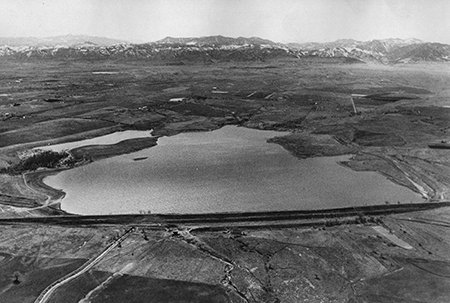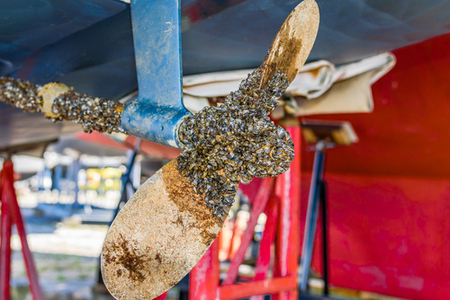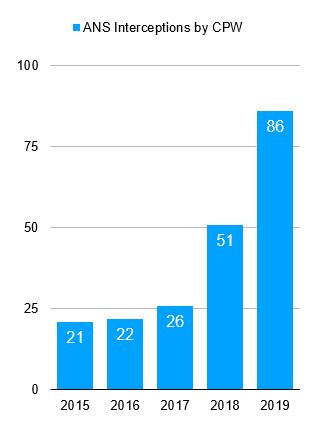The City of Westminster will prohibit trailered boating on Standley Lake to prevent the risk of a zebra and quagga mussel (ZQM) infestation.
This decision was made in response to the growing threat of ZQM infestation in Colorado waters from trailered boating.
Months of discussion and deliberation preceded this decision, involving a community-driven process in which staff and a citizen taskforce worked closely to create and review potential solutions. Unfortunately, no acceptable solutions were found.
The city’s number one priority is providing reliable, healthy drinking water, and Standley Lake is the source for over 300,000 people from three cities – Northglenn, Thornton and Westminster.
If ZQM enter Standley Lake, the cost of remediation for Westminster is estimated at $10 million in capital expenses and $3 million in annual operating costs, significantly increasing the cost to deliver water.
In addition to the financial costs, the establishment of ZQM would permanently change the ecology of Standley Lake, resulting in taste and odor issues and a reduction in water quality.
The city will continue recreational opportunities on and around the lake that do not pose a significant threat to water quality.
FAQs
About Standley Lake
 Standley Lake is the source of drinking water for the cities of Westminster and Northglenn. It is also a primary water supply for the City of Thornton. In all, Standley Lake serves approximately 300,000 residents with safe, healthy drinking water. Standley Lake Regional Park (SLRP) also provides critical habitat for a wide range of wildlife and vegetation including threatened and endangered species, as well as being a premier recreational destination. Popular activities at SLRP include watercraft use, hiking/walking, camping, fishing, wildlife viewing and recreation, wellness and education programs.
Standley Lake is the source of drinking water for the cities of Westminster and Northglenn. It is also a primary water supply for the City of Thornton. In all, Standley Lake serves approximately 300,000 residents with safe, healthy drinking water. Standley Lake Regional Park (SLRP) also provides critical habitat for a wide range of wildlife and vegetation including threatened and endangered species, as well as being a premier recreational destination. Popular activities at SLRP include watercraft use, hiking/walking, camping, fishing, wildlife viewing and recreation, wellness and education programs.
Learn more about the history of Standley Lake.
Standley Lake Recreational Intergovernmental Agreement
The Standley Lake Recreational Intergovernmental Agreement (IGA) is an agreement among Westminster, Northglenn and Thornton that governs the use of the lake. The current IGA allows for recreational uses at Standley Lake that all three cities agree on, and also gives all three cities a framework for resolving disputes related to the water supply instead of litigation, which would be the only recourse in the absence of an IGA.
The current IGA was drafted 25 years ago and expires Nov. 28, 2019. Staff from all three cities are working on the details of a renewed IGA. While the existing IGA allows boating, it also declares that its first priority is protection of the drinking water supply. Both Thornton and Northglenn have recently expressed serious concerns about the effect that boating on the lake will have on water quality.
Zebra & Quagga Mussels (ZQM)
Zebra and quagga mussels are considered Aquatic Nuisance Species (ANS) native to fresh waters in Eurasia.These small shellfish arrived in the Great Lakes in the 1980s and began spreading throughout the region. ZQM have now been identified in 31 states.
ZQM was not a significant concern for Colorado waters when the Intergovernmental Agreement was drafted 25 years ago. As ZQM moved west, the threat became a major concern for the state of Colorado. AZQM infestation in Standley Lake would cost Westminster about $10 million in capital expenses and $3 million annually in operating costs to mitigate the consequences.
ZQM infestation could also spread and impact the water systems of Northglenn and Thornton resulting in equal or greater damage and cost.
ZQM destroys ecosystems, creates taste and odor issues for treated water, and degrades water quality.
The Impact of Trailered Boats
Trailered boats are the primary vector for ZQM due to ballast tanks, trailers and internal compartments that cannot be sprayed or inspected.
Colorado Parks and Wildlife (CPW) found a record number of invasive species on boats in 2018. In November, CPW confirmed with city staff that boats carrying ZQM were intercepted in 2019.
 Motorized boating also has other environmental impacts including shoreline erosion and the proliferation of Eurasian watermilfoil (another invasive species common in Colorado waters and present in Standley Lake).
Motorized boating also has other environmental impacts including shoreline erosion and the proliferation of Eurasian watermilfoil (another invasive species common in Colorado waters and present in Standley Lake).
The following statistics were provided for the last five years: 
Standley Lake ANS Program
Standley Lake’s ANS program has existed since 2007, and it is recognized as the leader in ANS operation in the state due to its progressive and aggressive practices to allow trailered boats access to the lake without compromising water quality. The program began with a 7-day quarantine in 2007. In 2009, the quarantine was increase to 14 days after the state conducted testing and found that zebra mussel veligers survived longer than previously thought. In 2015, the city instituted a 35-day quarantine after further studies revealed that zebra mussel veligers could survive up to 28 days in ballast tanks.
On December 19, 2018 staff learned through a report by the Bureau of Reclamation at a Colorado Parks and Wildlife meeting that “ballast tanks are a risk for invasive mussel transport” and “current decontamination equipment (pressure washers) are not the best tool for decontamination.” Staff upgraded decontamination equipment in 2019 based on this report.
Timeline of Events
2007 - Westminster initiates Aquatic Nuisance Species (ANS) Protocol
2009 and 2015 - Modifications were made to the ANS Program based on recent research and best practices
December 19, 2018 - Staff attended CPW Meeting and learned of increasing ZQM risks and decontamination concerns
January-February, 2019 - Extensive research by staff on ZQM risks, ANS program integrity and legal liability
March 6, 2019 - A local boat mechanic demonstrates for staff how to physically circumvent the ANS program
March 19, 2019 - The City of Westminster announces ban on trailered boats due to risk of ZQM concerns
Steps after the March boating decision
Staff held a public meeting on April 2, 2019 for over 400 attendees. One outcome of this meeting was the creation of the Standley Lake Boating Taskforce (SLBT). The Park, Recreation, Libraries and Open Space Citizen Advisory Board was responsible for reviewing taskforce applicants and making selections to the SLBT that represent various boating and user groups. This citizen taskforce was chaired by a member of the Park, Recreation, Libraries and Open Space Citizen Advisory Board. The charge of the SLBT was to “evaluate options for restoring trailered boats to the lake without compromising the quality of the water.”
The SLBT met seven times between April 23 and October 15. Staff worked diligently, in cooperation with the boating community, to find a solution to restore trailered boating without compromising water quality. Extensive documentation of SLBT meetings, including meeting recordings and supporting materials, is available on the city website.
Rationale for the Ban on Trailered Boating
- Standley Lake is the source of drinking water for 300,000 people from three cities: Northglenn, Thornton and Westminster. Our number one priority is providing reliable, quality drinking water.
- There is a growing threat of zebra and quagga mussel infestation in Colorado waters from trailered boating. The number of mussel-infested boats intercepted by Colorado Parks and Wildlife has more than tripled in the last two years.
- Months of discussion and evaluation by a citizen taskforce, boaters and staff preceded this decision. A solution has not been identified to allow trailered boats back on the lake without the risk of compromising water quality.
- The Standley Lake Recreational Intergovernmental Agreement (IGA) governs the use of the lake. The city is working with our partners, Northglenn and Thornton, on a renewed IGA. Both partners have expressed concerns about trailered boats on the lake.
- The City of Westminster commits to continuing to work with its partner cities, Northglenn and Thornton, and Standley Lake stakeholders.
- If zebra or quagga mussels enter Standley Lake, the cost of ANS remediation for Westminster alone is estimated at $10 million in capital expenses and $3 million in annual operating costs, significantly increasing the cost to deliver water. The legal liability and financial risk could far exceed the above costs for remediation of city infrastructure.
- The establishment of zebra or quagga mussels will permanently change the ecology of Standley Lake, resulting in taste and odor issues and a reduction in water quality.
Decision
- Ban trailered boating.
- Consider the work of the Standley Lake Boating Taskforce complete.
- Continue recreational opportunities on and around the lake that do not pose a significant threat to water quality.
- Negotiate a renewed IGA that allows for the continued operation of recreational activities at Standley Lake that present less of a threat to the water system, while also addressing the distribution, control over and liability for risks to those systems from recreational activities.